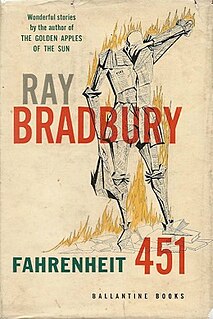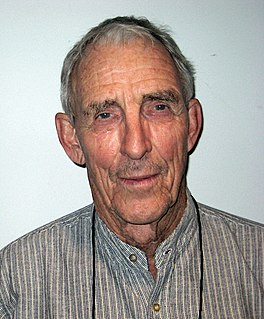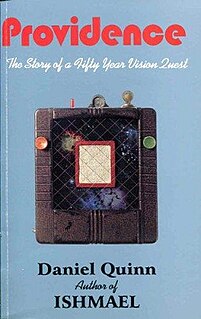
Fahrenheit 451 is a 1953 dystopian novel by American writer Ray Bradbury. Often regarded as one of his best works, Fahrenheit 451 presents an American society where books have been outlawed and "firemen" burn any that are found. The novel follows Guy Montag, a fireman who becomes disillusioned with his role of censoring literature and destroying knowledge, eventually quitting his job and committing himself to the preservation of literary and cultural writings.

Moby-Dick; or, The Whale is an 1851 novel by American writer Herman Melville. The book is the sailor Ishmael's narrative of the obsessive quest of Ahab, captain of the whaling ship Pequod, for revenge against Moby Dick, the giant white sperm whale that on the ship's previous voyage bit off Ahab's leg at the knee. A contribution to the literature of the American Renaissance, Moby-Dick was published to mixed reviews, was a commercial failure, and was out of print at the time of the author's death in 1891. Its reputation as a "Great American Novel" was established only in the 20th century, after the 1919 centennial of its author's birth. William Faulkner said he wished he had written the book himself, and D. H. Lawrence called it "one of the strangest and most wonderful books in the world" and "the greatest book of the sea ever written". Its opening sentence, "Call me Ishmael", is among world literature's most famous.

Ray Douglas Bradbury was an American author and screenwriter. One of the most celebrated 20th-century American writers, he worked in a variety of modes, including fantasy, science fiction, horror, mystery, and realistic fiction.

Robert Edward "Ted" Turner III is an American entrepreneur, television producer, media proprietor, and philanthropist. He founded the Cable News Network (CNN), the first 24-hour cable news channel. In addition, he founded WTBS, which pioneered the superstation concept in cable television, which later became TBS.

Ishmael is a 1992 philosophical novel by Daniel Quinn. The novel examines the hidden cultural biases driving modern civilization and explores themes of ethics, sustainability, and global catastrophe. Largely framed as a Socratic conversation between two characters, Ishmael aims to expose that several widely accepted assumptions of modern society, such as human supremacy, are actually cultural myths that produce catastrophic consequences for humankind and the environment. The novel was awarded the $500,000 Turner Tomorrow Fellowship Award in 1991, a year before its formal publication.

Daniel Clarence Quinn was an American author, cultural critic, and publisher of educational texts, best known for his novel Ishmael, which won the Turner Tomorrow Fellowship Award in 1991 and was published the following year. Quinn's ideas are popularly associated with environmentalism, though he criticized this term for portraying the environment as separate from human life, thus creating a false dichotomy. Instead, Quinn referred to his philosophy as "new tribalism".

William Clark Styron Jr. was an American novelist and essayist who won major literary awards for his work.
This article contains information about the literary events and publications of 1966.

Ishmael Scott Reed is an American poet, novelist, essayist, songwriter, playwright, editor and publisher known for his satirical works challenging American political culture. Perhaps his best-known work is Mumbo Jumbo (1972), a sprawling and unorthodox novel set in 1920s New York.

Wallace Earle Stegner was an American novelist, short story writer, environmentalist, and historian, often called "The Dean of Western Writers". He won the Pulitzer Prize in 1972 and the U.S. National Book Award in 1977.

The National Merit Scholarship Program is a United States academic scholarship competition for recognition and university scholarships administered by the National Merit Scholarship Corporation (NMSC), a privately funded, not-for-profit organization based in Evanston, Illinois. The program began in 1955.

The Writers' Trust of Canada is a charitable organization which provides financial support to Canadian writers.
Thom Mayne is an American architect. He is based in Los Angeles. In 1972, Mayne helped found the Southern California Institute of Architecture (SCI-Arc), where he is a trustee and the coordinator of the Design of Cities postgraduate program. Since then he has held teaching positions at SCI-Arc, the California State Polytechnic University, Pomona and the University of California, Los Angeles (UCLA). He is principal of Morphosis Architects, an architectural firm based in Culver City, California and New York City, New York. Mayne received the Pritzker Architecture Prize in March 2005.
The Academy of American Poets is a national, member-supported organization that promotes poets and the art of poetry. The nonprofit organization was incorporated in the state of New York in 1934. It fosters the readership of poetry through outreach activities such as National Poetry Month, its website Poets.org, the syndicated series Poem-a-Day, American Poets magazine, readings and events, and poetry resources for K-12 educators. In addition, it sponsors a portfolio of nine major poetry awards, of which the first was a fellowship created in 1946 to support a poet and honor "distinguished achievement," and more than 200 prizes for student poets.

Peter Matthiessen was an American novelist, naturalist, wilderness writer, zen teacher and CIA Operative. A co-founder of the literary magazine The Paris Review, he was the only writer to have won the National Book Award in both nonfiction and fiction. He was also a prominent environmental activist.

Providence: The Story of a Fifty-Year Vision Quest is a book by Daniel Quinn, published in 1994, and written largely as an autobiography blended with additional philosophical reflections. It details how Quinn arrived at the ideas behind his 1992 novel Ishmael and articulates upon some of these ideas.
James Baker Hall was an American poet, novelist, photographer and teacher.
Theodore Roosevelt Patrick, Jr. is an American deprogrammer and author. He is considered to be the "father of deprogramming."
Sierra Club Books was the publishing division of the Sierra Club, founded in 1960 by then Sierra Club President David Brower. Volumes intended for club members had been published prior to 1960. In addition, books under their name had been published before 1960, but done through already established publishers, as was the case with This Is Dinosaur, published by Alfred A. Knopf. Their first in-house book, volume 1 in the Exhibit Format series, was This is the American Earth, published in 1960. In 1962, they introduced color photography to the series with the publication of In Wildness Is the Preservation of the World with photographs by Eliot Porter and Island In Time: The Point Reyes Peninsula with photographs by Philip Hyde. The series won the 1964 Carey–Thomas Award for creative publishing, by Publishers Weekly. Fifty thousand copies were sold in the first four years, and by 1964 sales exceeded $10 million. Soon they were publishing two new titles a year in the Exhibit Format series, but not all did as well as In Wildness. The books were successful in introducing the public to wilderness preservation and the Sierra Club, but lost money for the organization, some $60,000 a year after 1964. Paperback reprints of many of the Exhibit Format books were published by Ballantine Books. After David Brower left the Club, the books program moved to New York City, then back to San Francisco under the leadership of Jon Beckmann. During Beckmann's tenure from the mid-1970s until 1994 the program expanded and diversified considerably, publishing books by established and emerging authors such as Wendell Berry, Robert Bly, Galen Rowell, and David Rains Wallace as well as field guides, fiction, poetry, and books on environmental activism, such as the Sierra Club Battlebooks. Many Sierra Club books were produced by the Yolla Bolly Press run by Jim and Carolyn Robertson in Covelo, California. The program continued for two decades after 1994, first under Peter Beren, the former marketing director, then under Helen Sweetland, the former children's books editor. The press closed in 2014. The Club continues to publish the Sierra Club Wilderness Calendar and the Sierra Club Engagement Calendar annually, which are perennial bestsellers. They are distributed to the book trade by Publishers Group West.
Thomas Henry Guinzburg was an American editor and publisher who served as the first managing editor of The Paris Review following its inception in 1953 and later succeeded his father as president of the Viking Press.












